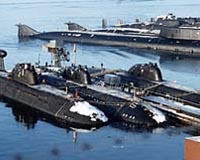 |
Washington (AFP) March 29, 2010 The United States and India said Monday they have reached an agreement on reprocessing nuclear material, clearing a major hurdle in putting into operation a landmark atomic energy pact. The agreement, reached after nine months of painstaking negotiations, would allow India to reprocess spent nuclear fuel from the United States. Washington earlier had reprocessing deals only with European Union members and Japan. "I think this reflects a much broader, deeper and expanded relationship between our two countries," State Department spokesman Philip Crowley told reporters. The Indian government said in a statement that the two nations "have taken an important step towards implementing civil nuclear cooperation." The United States and India signed their nuclear agreement in 2008, a signature part of the deepening relationship between the world's two largest democracies. But US companies have yet to benefit from the agreement because of the lingering technicalities. In the meantime, Russian and French rivals have been making headway in India's growing market. "This is encouraging. We have now resolved one of a few remaining implementation hurdles and I'm optimistic at clearing the others," said Ted Jones, who works on the nuclear issue at the US-India Business Council. The United States is asking the Indian government to approve laws on two other key issues. The United States wants India to codify its precautions against proliferation. This is to meet US laws under which the Energy Department needs to give the green light for each US nuclear project abroad. Before US companies do business in India, they also want New Delhi to approve a law limiting the liability of vendors in the case of an accident. Operators would bear legal responsibility for mishaps. Prime Minister Manmohan Singh's government has struggled to move ahead in parliament on the liability bill faced with opposition from both the left and right. Critics point to what they see as light punishment of US executives following the 1984 industrial disaster in Bhopal, in which as many as 10,000 Indians died in a leak from the Union Carbide pesticide plant. Jones disputed the criticism, saying liability laws were customary around the world and were also sought by French companies in India. "There is a misperception that it's just US companies and that's been very harmful because it makes us seem like a bunch of irresponsible multinational scofflaws," he said. "Nothing could be further from the truth." India had been denied access for decades to civilian markets for atomic energy due to its nuclear weapons program and refusal to sign the Nuclear Non-Proliferation Treaty, which New Delhi says is discriminatory. The nuclear deal, championed by Singh and former US president George W. Bush, had to overcome controversy in both countries. In India, many lawmakers said the deal was too intrusive. Some members of President Barack Obama's Democratic Party feared the agreement would set a bad precedent for aspiring nuclear nations such as Iran, although Obama after taking office pledged to go ahead with the deal. Last week, top officials from India's historic rival Pakistan visited Washington for high-level talks in which they sought a similar nuclear cooperation deal. US officials were cool to the idea.
Share This Article With Planet Earth
Related Links Nuclear Power News - Nuclear Science, Nuclear Technology Powering The World in the 21st Century at Energy-Daily.com
 Nuclear twist: when Russia's old warheads warm US homes
Nuclear twist: when Russia's old warheads warm US homesWashington (AFP) April 11, 2010 In a strange twist of Cold War enmity on the melt, uranium from what once were Russian nuclear warheads is used to heat and light American homes, thanks to the Megatons to Megawatts Program - a successful example of nuclear non-proliferation. The 20-year agreement was signed back in 1994 between Russia and the United States. "Megatons to Megawatts is the most successful non-proliferatio ... read more |
|
| The content herein, unless otherwise known to be public domain, are Copyright 1995-2010 - SpaceDaily. AFP and UPI Wire Stories are copyright Agence France-Presse and United Press International. ESA Portal Reports are copyright European Space Agency. All NASA sourced material is public domain. Additional copyrights may apply in whole or part to other bona fide parties. Advertising does not imply endorsement,agreement or approval of any opinions, statements or information provided by SpaceDaily on any Web page published or hosted by SpaceDaily. Privacy Statement |